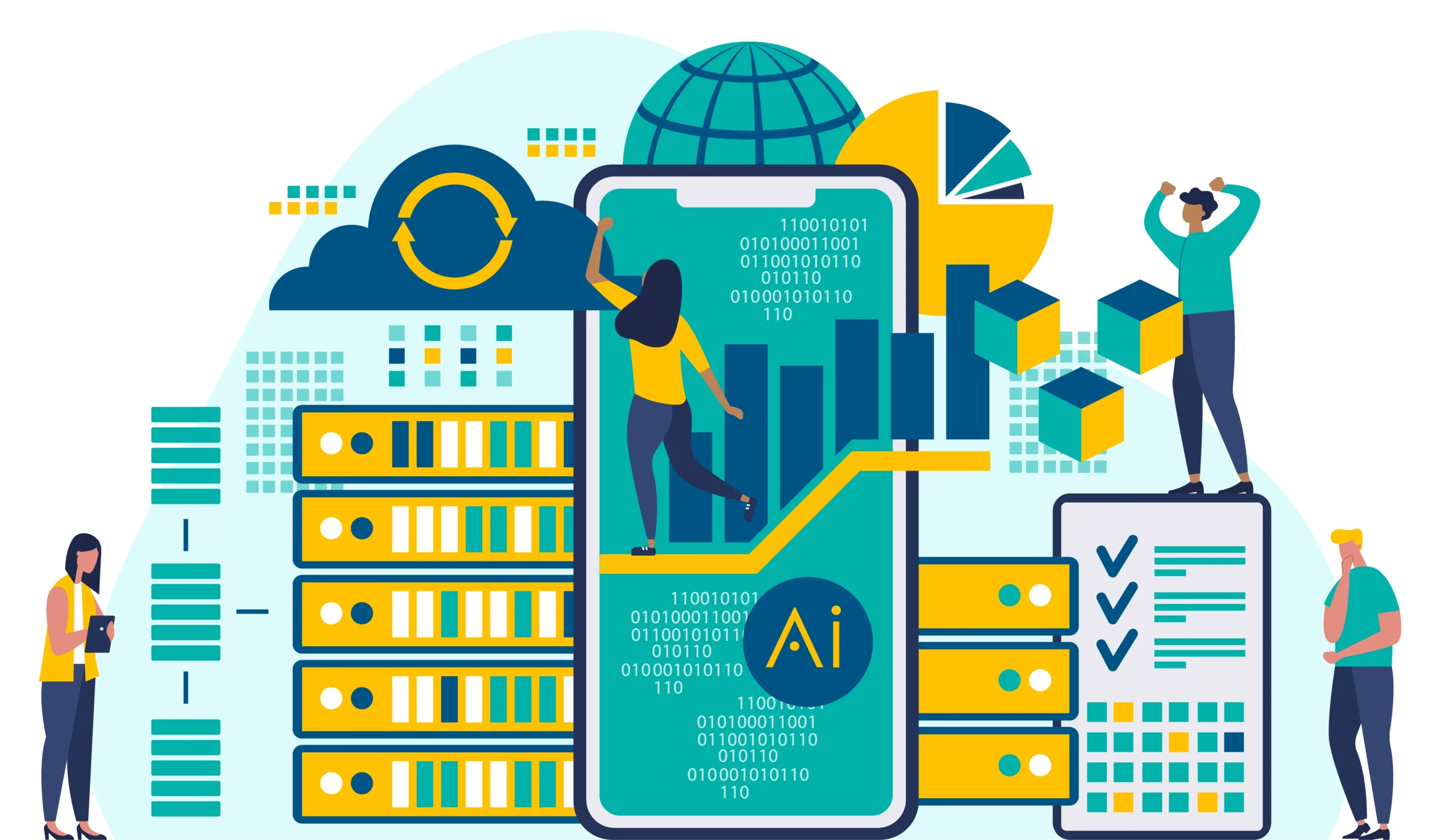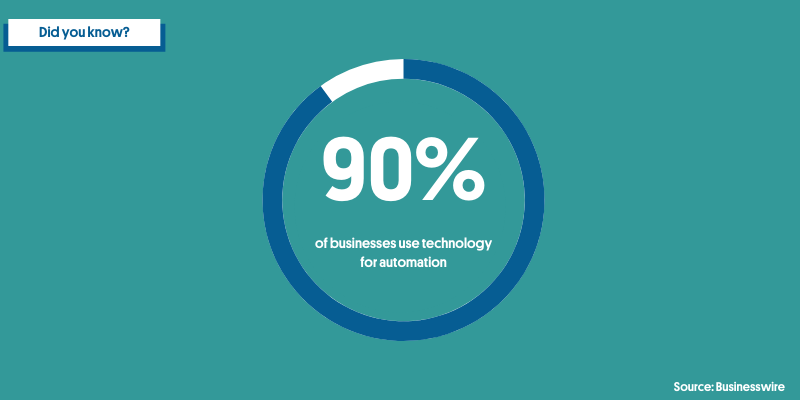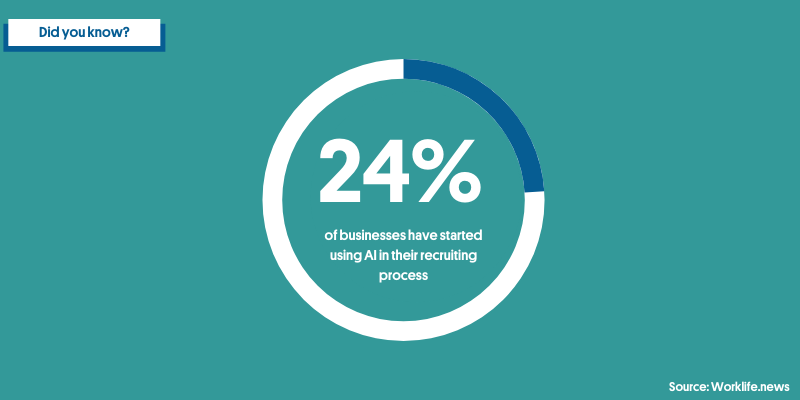Pros and Cons of Using AI in Recruiting

Is AI the future of recruitment? With 84% of business leaders betting on AI for a competitive edge, it’s time to explore the transformative role of AI in the hiring process. Dive into our insightful article to uncover the pros and cons of AI in recruitment and discover if it’s the right fit for your business.
According to Forbes, 84% of business leaders have said that they believe artificial intelligence (AI) is the trend in the future that will help them stay competitive and have an advantage in the job market.
While AI recruitment tools are powerful for hiring managers and recruiters, there are still some pros and cons to using them, especially in recruiting. However, do the pros outweigh the cons?
Keep reading to understand what AI could look like in your recruiting process and whether it suits your business.
**New: take our online class Recruiting with ChatGPT to learn more about recruiting with AI **
AI Pro: Reduce Administration Time
90% of businesses use automation software to cut down on administrative time and tasks, and AI can also help with that. While there are different automation software, AI is great at recognizing patterns and can improve automation efficiency.

You can use this automation to take care of admin tasks, like screening candidates, searching for qualifications and skills, answering candidate questions during off-hours, analyzing data, and setting up interviews for applicants.
The software can also screen resumes and organize applications in your applicant tracking software (ATS) so that you can easily find and manage them.
Artificial Intelligence Pros and Cons
AI Pro: Better Communication
While recruiters want to build relationships with all kinds of candidates, it can be challenging to manage and develop relationships with many at once. However, AI can help to improve your communication.
AI is very popular in chatbots; customer service-focused companies have used it for years. Now, recruiters can use it in their recruiting process.
AI can help your candidate outreach by acting as a representative to answer a candidate’s questions. The chatbot can answer simple questions that you don’t necessarily need to take time to respond to. If a candidate has a question that AI can’t answer, you can step in and talk with the candidate.
There is even some new AI technology called Personality AI. This technology analyzes how candidates interact and their personality traits and relays this information to you. With this information, you can formulate a better strategy to build a genuine relationship with the candidate.
AI Cons: Lack of Human Judgment
While AI can be great at predicting patterns, sometimes you need human judgment involved in the process, especially when screening applicants.
If you’re not careful, your AI could be reading insufficient data and then be stuck in a process suggesting the same types of candidates for your business. That doesn’t mean that you shouldn’t use AI. Instead, while AI is an excellent place to get you started, you should look back over and review the decisions AI made and ensure that you agree.
AI Pro: More Quality Candidates
24% of businesses use AI to acquire top talent. This can help bring in more qualified candidates if you only get a few applicants to apply. AI can also help recruiters cut down any time wasted by looking through resumes of people who aren’t qualified.

AI can act as a candidate screening system through candidates and resumes and pick out the most suitable candidates for a job. When you find those candidates, you can reach out to them and focus on creating a relationship with them now that you have more time since you aren’t managing the screening step.
AI Con: May Be Less Accurate
AI can only function when you feed it data, so if you have bad or insufficient data, your AI may not be accurate enough for your recruiting process. There are still some relatively new areas of AI, and you may have a few errors from time to time.
For example, a candidate might use a different phrase or keyword to describe a skill. If the AI doesn’t have enough data to realize the skill is transferable, it may skip over a qualified candidate.
On the flip side, many candidates also learn how AI works and realize the importance of keywords. This could lead to them putting keywords into their resume that make them seem more qualified than they are. However, AI won’t be able to tell the difference and will still recommend them as qualified candidates.
That’s why it’s always important to look over the results from AI before you hand a list of candidates over to the hiring manager. You should also ensure that you give it quality data to read.
AI Pro: Speeds Up Recruitment Process
Depending on what industry you’re recruiting for, the average recruiting process could take anywhere from twelve to forty days . But some research also suggests that the best candidates are off the job market in just ten days.
To ensure that you’re hiring the most qualified applicants, you can use AI-based tools to speed up your hiring process. Whether by improving job descriptions, screening applicants, streamlining the interview setup process, or identifying top talent, AI can make your recruitment processes more efficient. The longer your hiring process takes, the more opportunity a competitor has to snatch up the candidate you were considering hiring.
AI Con: Regulations Are Changing
While using AI in the recruiting process can make your hiring process more fair and unbiased, there are some cases where there can still be bias. You must be careful when selecting AI tools, or you could have biased hires.
Because of this, some countries are regulating the use of AI in the recruiting process to ensure that there is still a fair hiring process for everyone. For example, New York proposed legislation regulating how AI algorithms work in hiring. While nothing has been passed, it is something to consider when looking for the right recruiting solution.
AI Con: Can Be Impersonal
One thing that AI is not great at doing is building a solid relationship with candidates. While AI chatbots can be great for answering frequently asked questions, a recruiter still needs to create an authentic candidate relationship.
However, AI can help recruiters build that relationship by automating and taking care of other tasks that don’t need a personal touch. Recruiters can get back to doing what they love: creating a relationship with candidates to recruit them for an open position successfully.
This is one reason AI will never fully replace a recruiter’s job. Human decisions are always needed in HR areas, like interviewing and deciding which candidate would best fit the job. But AI can help you get there faster.
AI Pro: Reduces Human Bias
Regardless of how hard the best recruiter can try, they may still have some unconscious human biases. Some recruiters might make decisions based on different factors, even with proper training and care.
This is where AI can come in. It can ignore factors like a candidate’s personality, education, gender, or ethnicity. Instead, it can focus on the qualifications, experience, and skills that might make them great candidates.
Xuan Smith, a CTO,follows a similar strategy to reduce bias in his sourcing software: “This software identifies people based on their work history, how long they were at their job, and what their company does. However, we don’t consider education in our algorithm because we don’t find it a huge predictor of success.”
Future Trends in AI Recruitment
AI recruitment is not a future concept; it’s already here and has started making ripples in the HR landscape. As we move forward, the adoption of AI in recruitment will only intensify, and the scope of its application will widen. Here are some of the future trends that we can expect in AI recruitment:
- Predictive Analysis: AI can predict a candidate’s success in a role based on their past experiences, skills, and behavioral patterns. This predictive analysis can help recruiters make more informed decisions and hire candidates more likely to succeed and stay with the company in the long run.
- Enhanced Candidate Experience: AI can make recruitment more user-friendly and efficient for candidates. For instance, chatbots can answer candidates’ queries in real-time, scheduling tools can make it easier to book interview slots, and automated feedback systems can ensure that every candidate gets a response.
- Bias-Free Hiring: AI can significantly reduce unconscious bias in recruitment by focusing solely on skills, qualifications, and experience rather than personal characteristics. This can lead to a more diverse and inclusive workforce.
- Integration with other HR Functions: AI won’t just stay limited to recruitment; it will get integrated with other HR functions like onboarding, training, performance management, etc. This will result in a more holistic HR tech ecosystem.
- Data Security and Privacy: As the use of AI increases, so will the emphasis on data security and privacy. Companies must ensure their AI systems comply with data privacy laws and respect candidates’ privacy rights.
- Ethical Use of AI: As AI becomes more prevalent in recruitment, discussions around the ethical use of AI will become more crucial. Companies must ensure that their use of AI is transparent, fair, and doesn’t result in discrimination.
In Conclusion
In the world of recruitment, AI is no longer just a buzzword. It’s a powerful tool that can help companies streamline their recruitment process, make better hiring decisions, and enhance the candidate experience. However, like any tool, it must be used responsibly and ethically.
While AI has great potential, it’s not a silver bullet that can solve all recruitment challenges. Human judgment and intuition still play a critical role in the hiring process. As such, the future of recruitment lies not just in AI but in the synergy between AI and human intelligence. This combination will lead to a more efficient, fair, and candidate-friendly recruitment process, helping companies attract and hire the right talent.
The key is to embrace AI, not fear it. By understanding its strengths and limitations, companies can use AI to complement their existing recruitment practices and drive their success to new heights. Remember, AI is here to assist, not replace. And with the right approach, it can be a game-changer in your recruitment process.
Learn more about our Recruiting Solutions
Hiring talented employees? Recruiter.com offers advanced recruiting solutions to fit every budget.
Glossary of Key AI Recruiting Terms
- Artificial Intelligence (AI): A branch of computer science that aims to create systems capable of performing tasks that usually require human intelligence, such as understanding natural language, recognizing patterns, and making decisions.
- Machine Learning (ML): A subset of AI that focuses on building algorithms that allow computers to learn from and make decisions based on data.
- Natural Language Processing (NLP): The ability of a computer program to understand human language in a valuable way.
- Deep Learning: A subset of machine learning that uses neural networks with many layers (hence the ‘deep’ in deep learning) to analyze various factors with a structure similar to the human brain.
- Chatbot: An AI software designed to interact with humans in their natural language, often used in recruiting for initial candidate interactions.
- Predictive Analytics: Using data, statistical algorithms, and machine learning techniques to identify the likelihood of future outcomes based on historical data.
- Algorithm: A set of instructions for a computer program to complete a specific task.
- Data Mining: The process of discovering patterns in large data sets involving methods at the intersection of machine learning, statistics, and database systems.
- Bias in AI: When an AI system offers unfair or prejudiced output due to certain assumptions in the algorithm.
- Automated Screening: The use of AI to automatically screen and sort through job applications and resumes.
- Candidate Ranking: Using AI algorithms to rank candidates based on qualifications, experience, and suitability for the job.
- Talent Analytics: Data analysis techniques in employee recruitment, development, and retention.
- AI Sourcing: The use of AI to identify, assess, and engage potential candidates for a job opening.
- Semantic Search: A type of search that uses AI to understand the searcher’s intent and the contextual meaning of terms to generate more relevant results.
- Programmatic Job Advertising: The use of technology to automate the buying, placement, and optimization of job ads in real time.
- Robotic Process Automation (RPA): The use of software robots or “bots” to automate highly repetitive routine tasks.
- Resume Parsing: The process of converting an unstructured form of resume data into a structured format using AI.
- Skill Mapping: The use of AI to map out the skills required for a particular job and match them with candidates’ skills.
- People Analytics: Using data and data analysis techniques to understand, improve, and optimize the people side of the business.
- Conversational AI: Artificial intelligence that allows computers to understand, process, and respond to voice or text inputs naturally, typically used in chatbots.
- Sentiment Analysis: Using AI to identify and extract subjective information from source materials.
- AI Ethics: The field of study, policy, and practice focused on ensuring the ethical use of AI technologies.
- Onboarding Automation: Using AI to streamline and automate the employee onboarding process.
- Intelligent Virtual Assistant (IVA): An AI system that can perform tasks or services for an individual, often used in recruitment to schedule interviews, answer common questions, etc.
- Personality AI: An AI system that analyzes a candidate’s personality traits based on their interactions and inputs.

